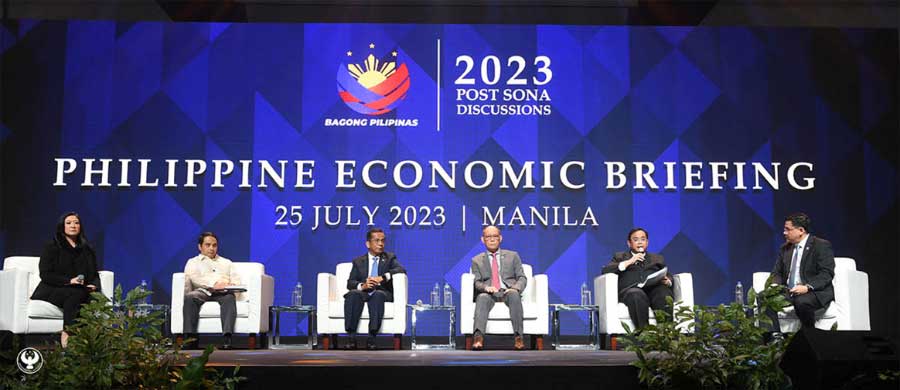
Bangko Sentral ng Pilipinas (BSP) Governor Eli M. Remolona Jr. underscored that the domestic banking system provided strong support to the country’s post-pandemic recovery, during the Post-State of the Nation Address (SONA) Philippine Economic Briefing (PEB) on 25 July 2023 at the Philippine International Convention Center in Pasay City.
“Part of the reason behind this economic resurgence is the strength of our banking system. Unlike in previous crises, our banks formed part of the solution rather than part of the problem,” explained the BSP chief in a recorded message.
Governor Remolona also said that by the fourth quarter of 2023, inflation is expected to settle within the government’s target range of 2.0 to 4.0 percent, a rate which he described as ideal for the country’s growth at full capacity.
Moreover, he cited the accelerated digitalization in the banking and payments systems, which presents opportunities for efficiency, competitiveness, and financial inclusion in the country.
With the theme, “Agenda for Prosperity: Economic Transformation Toward Inclusivity and Sustainability,” the Post-SONA PEB gathered around 1,000 members of the business and financial communities, development partners, civil society organizations, and the media together with key government officials to discuss the pronouncements of President Ferdinand Marcos Jr. in his second SONA and the economic agenda of the administration.
BSP Deputy Governor Francisco G. Dakila Jr. represented Governor Remolona in the first panel discussion, joined by Secretary of Finance Benjamin E. Diokno, National Economic and Development Authority Secretary Arsenio M. Balisacan, and Department of Budget and Management Principal Economist Joselito R. Basilio.
Deputy Governor Dakila noted that the BSP’s monetary policy actions will continue to be data-dependent and “guided by evolving domestic developments, particularly its latest outlook on inflation and sustained economic growth.”
Secretary Diokno underscored the Philippine economy’s resilience built on a solid fiscal foundation steered by the Medium-Term Fiscal Framework that aims to reduce the debt-to-gross domestic product (GDP) and deficit-to-GDP ratios and sustain high infrastructure spending. “Our consistently strong fiscal performance as well as improving revenue generation and spending efficiency brings us closer to these goals,” he said.
SM Investments Corporation Vice Chairperson Teresita Sy-Coson, Management Association of the Philippines President Benedicta Du-Baladad, Asian Development Bank Country Director for the Philippines Pavit Ramachandran, and International Monetary Fund (IMF) Representative to the Philippines Ragnar Gudmundsson shared their views on the Philippines’ socioeconomic agenda in the second panel discussion.
“We in the private sector would be doing good for [economic growth] if we work with the government,” said SM Investments Corporation Vice Chairperson Sy-Coson. She also cited stronger coordination between the National Government and local government units to ease business processes and increase growth opportunities.
IMF Representative to the Philippines Gudmundsson stated that focusing on boosting competitiveness, opening the economy to foreign direct investments, promoting trade liberalization, and reducing infrastructure and education gaps can strengthen the export sector. “These can be key to enhance productivity and attract new investments,” he said.






















